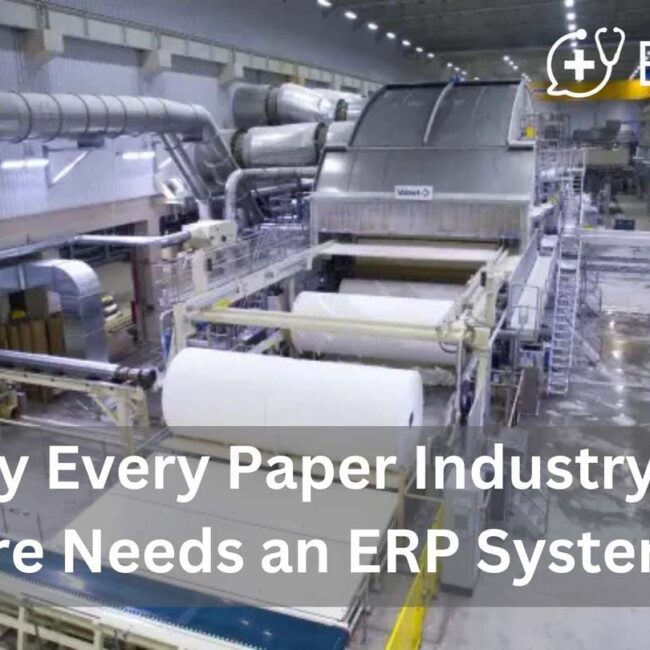
5 Ways ERP Can Enhance Efficiency in Heavy Engineering

The Essential Guide to ERP in Heavy Engineering: Features and Benefits
In the ever-evolving landscape of Heavy engineering, businesses face unique challenges that demand innovative solutions. Enter —a comprehensive system tailored to meet the specific needs of industries like heavy engineering. This advanced technology integrates various business functions and provides real-time data visibility, enabling companies to respond swiftly to changing market demands and optimize their processes. This blog explores how ERP software for Heavy Engineering can transform your operations, enhance efficiency, and drive profitability, ultimately ensuring long-term success in a competitive market landscape. With the right implementation, organizations can leverage these solutions to streamline workflows and improve collaboration across departments.
Understanding the Need for ERP in Heavy Engineering
Heavy engineering encompasses a range of activities, including the design, construction, and maintenance of large-scale projects. Companies in this sector often struggle with:
- Complex project management
- Supply chain inefficiencies
- Compliance and regulatory issues
- Real-time data visibility
To address these challenges, organizations increasingly turn to ERP solutions for Heavy Engineering. ERP offers a robust framework that integrates various business functions, from finance to project management, streamlining processes and ensuring that all departments work in harmony.
What is ERP?
ERP is an integrated enterprise resource planning solution designed specifically for small to medium-sized businesses. It provides a comprehensive suite of tools that facilitate better management of business operations, including finance, sales, inventory, and customer relationship management (CRM).
Key Features of ERP for Heavy Engineering
- Project Management
- Efficiently manage large-scale projects with features that allow for detailed tracking, budgeting, and scheduling.
- Supply Chain Management
- Optimize your supply chain by monitoring inventory levels, procurement processes, and supplier relationships in real time.
- Financial Management
- Gain visibility into financial performance through integrated accounting tools, enabling informed decision-making.
- Reporting and Analytics
- Leverage powerful reporting tools that provide insights into operational efficiency, helping to identify areas for improvement.
- Customization and Scalability
- Adapt the solution to your specific needs with customizable features that grow alongside your business.
Benefits of Implementing ERP for Heavy Engineering
Enhanced Operational Efficiency
One of the standout benefits of ERP Implementation for Heavy Engineering is its ability to streamline operations. By integrating various functions, companies can reduce redundancy and ensure that everyone has access to the same data. This not only saves time but also minimizes errors, allowing teams to focus on critical tasks.
Improved Project Visibility for Heavy Engineering
Heavy engineering projects are often complex and require meticulous oversight. With ERP software for Heavy Engineering, project managers can track progress in real time, ensuring that projects remain on schedule and within budget. This transparency fosters better collaboration and communication among teams.
Better Financial Control
Managing finances is crucial in heavy engineering, where large investments and tight margins are common. ERP solutions for Heavy Engineering include robust financial management tools that provide real-time insights into cash flow, expenses, and profitability. This empowers businesses to make data-driven decisions that enhance financial performance.
Regulatory Compliance
The heavy engineering sector is subject to various regulations, and compliance is critical. ERP provides the tools necessary to maintain compliance with industry standards. Automated reporting and documentation processes ensure that your organization stays ahead of regulatory requirements, minimizing risks associated with non-compliance.
Scalability for Future Growth with ERP
As your engineering business grows, so do its needs. ERP for Heavy Engineering is designed to scale alongside your organization. Whether you’re expanding into new markets or adding new projects, Software can be customized to fit your evolving requirements.
ERP in Heavy Engineering
A Leading Construction Firm
A prominent construction firm faced challenges with project delays and budget overruns. By ERP Implementation for Heavy Engineering, they gained real-time insights into project timelines and budgets. This allowed project managers to make timely adjustments, ultimately reducing project completion times by 20%.
A Heavy Machinery Manufacturer
A manufacturer of heavy machinery struggled with supply chain inefficiencies. After integrating they streamlined their procurement process, resulting in a 30% reduction in inventory holding costs. This not only improved cash flow but also allowed them to respond more quickly to customer demands.
Getting Started with ERP in Heavy Engineering
Implementing ERP is a significant step towards transforming your Business operations. Here’s how to get started:
1. Assess Your Needs
Begin by conducting a thorough assessment of your current processes and identifying pain points that ERP Implementation for Heavy Engineering can address. This step is crucial to ensure that you choose the right modules and features for your organization.
2. Choose the Right Implementation Partner
Partnering with an experienced ERP implementation partner is essential. They can guide you through the installation process, provide training for your team, and offer ongoing support.
3. Customize the Solution
Once Software is installed, customize it to fit your specific needs. Take advantage of the flexible configuration options to ensure that the system aligns with your business processes.
4. Train Your Team
Invest in comprehensive training for your employees. Familiarity with ERP solutions for Heavy Engineering will maximize the benefits of the system and enhance overall productivity.
5. Monitor and Optimize
After implementation, continuously monitor system performance and gather feedback from users. Regularly review processes to identify areas for further optimization.
The heavy engineering sector is ripe for innovation, and powerful tool that can drive transformation. By leveraging ERP for Heavy Engineering, companies can enhance operational efficiency, improve project visibility, and gain better financial control. Whether you are managing complex projects or navigating regulatory challenges, ERP software for Heavy Engineering offers the solutions needed to thrive in a competitive landscape.
Investing in ERP solutions for Heavy Engineering is not just a step toward modernization; it’s a strategic move that positions your business for sustainable growth and success. By embracing these advanced tools, you can streamline operations and stay ahead of industry trends. Don’t wait—explore the possibilities today and unlock the full potential of your heavy engineering operations.
Visit ERP Doctor for Expert Solutions and Support
Want to speak to an expert? Fill in the form below, and we will be in touch with you shortly!







